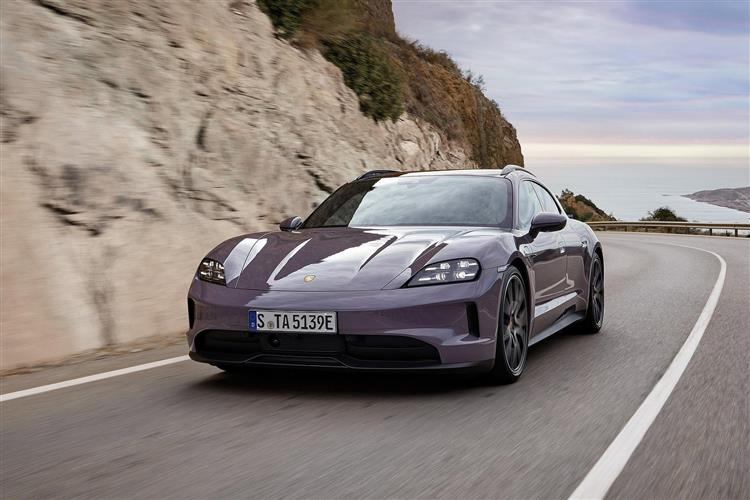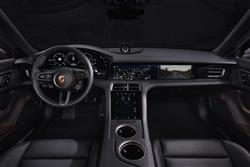MINISTRY Of SPORT (some text hidden) --NONE--
By Jonathan Crouch
Porsche's Taycan Sport Turismo adds finesse to the market's wildest electric SUV. Jonathan Crouch takes a look at the improved version.
Ten Second Reviewword count: 47
If you'd like your Porsche Taycan luxury EV with extra presence and practicality but don't want or need the look of an SUV, Zuffenhausen wants you to consider this, the Taycan Sport Turismo. Your ultimate luxury sports EV? Very possibly. Here's a look at the revised version.
Backgroundword count: 124
This might be the perfect interpretation of Porsche's Taycan concept. This luxury EV first appeared in Sports Saloon four-door form. Then we got the Cross Turismo SUV version. What if you could get the best of both, the suspension of the Sports Saloon with the practicality of the Cross Turismo body shape? That's the idea behind the Taycan Sport Turismo. Now it's been significantly improved - faster, longer-ranging and quicker-charging. As before, there's a wider choice of drivetrain options with this third interpretation of the Taycan theme - compared to the 'Cross' version anyway. You can also have a rear-driven variant - an option not possible with the Cross Turismo. That means a significantly lower entry price them with the 'Cross' too. Sounds interesting.
Driving Experienceword count: 477
As before, all Sport Turismo derivatives are almost indecently fast, but quite a lot's new with this revised version, though for the time being, Porsche has decided not to adopt a tri-motor drive system like that used in a rival Maserati GranTurismo Folgore. Instead, Zuffenhausen has redesigned this Taycan's rear electric motor, which is 10.4kg lighter than before, but up to 108PS more powerful, depending on the variant you're looking at. As for EV range, well that's up substantially. With the base rear-driven version, it can be up to 404 miles from the brand's largest (and now standardised) 105kWh 'Performance Battery Plus' pack. Total power output is considerably higher across the range coimpared to the original Sport Turismo. When fitted with the Sport Chrono Pack that most customers want and with launch control engaged, the base single-motor rear-driven Taycan Sport Turismo now offers up to 435PS (26PS more than the equivalent original base model offered). Which means that 62mph with launch control is dispatched in just 4.8s en route to 143mph. And that's at the bottom of the range. The power output for the mid-range dual-motor Taycan 4S is 598PS (up 68PS from before). As for the variants further up the line-up, the GTS version has 700PS, the strangely-named 'Turbo' variant offers 884PS (203PS more than the original model) and the fiery Turbo S develops an impressive 952PS (188PS more than before). What else? Well air suspension is now mandatory (the old coil-spring set-up's no longer offered) and the twin-chamber air springs are matched to the new dual-valve dampers recently introduced in the Panamera. This more greatly varies the car's behaviour between its 'Comfort' and 'Sport' modes and allows for variable ride heights at high speeds. As before, the most difficult task the engineers had here was in disguising what as usual on an EV is a prodigious kerb weight - in this case around 2.3-tonnes. Plenty's been thrown at that problem as part of this update. Optional is an Active air suspension system which enables individual control of each damper via a small electrically-driven compressor. Roll and pitch through the bends can then be countered, without the need for the physical anti-roll bars used in the previously-available PDCC anti-roll system. Turbo and Turbo S models get Porsche's Torque Vectoring Plus rear differential, which through turns is able to over-speed the outer rear wheel to help the Taycan's cornering balance. Rear-wheel steering is optional across the line-up (and standard on the Turbo S). And all of this tech is co-ordinated by a clever Porsche 4D Chassis Control set-up. The result through the turns is quite simply astonishing when you consider the amount of weight in play here. And the steering, brakes and ride quality are all brilliant - almost 911-like. No other large EV drives like this. The soul of a sports car? That about covers it.
To see the full road test text contact us on 0330 0020 227
Pictures (high res disabled)

.jpg)
|
.jpg)
|
.jpg)
| |||
.jpg)
|
.jpg)
|
.jpg)
| |||
.jpg)
|
.jpg)
|
.jpg)
| |||

|
Statistics (subset of data only)
Min |
Max |
|
Price: |
£89,200.00 (At 2 Apr 2025, Taycan) |
£163,200.00 (At 2 Apr 2025, Turbo S) |
Insurance group 1-50: |
50 |
|
Max Speed (mph): |
143 (Taycan) |
155 (Turbo S) |
0-62 mph (s): |
4.8 (Taycan) |
2.4 (Turbo S) |
Electric WLTP-Rated Driving Range (miles): |
377 |
|
Length (mm): |
4963 |
|
Width (mm): |
1966 |
|
Height (mm): |
1390 |
|
Boot Capacity (l): |
446 |
|
Power (ps): |
408 (Taycan) |
952 (Turbo S) |
Scoring (subset of scores)
Category: Hybrid, Plug-in, Electric & Hydrogen
| Performance | |
| Handling | |
| Comfort | |
| Space | |
| Styling, Build, Value, Equipment, Depreciation, Handling, Insurance and Total scores are available with our full data feed. | |



